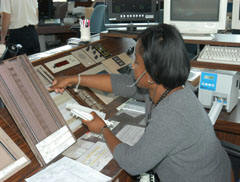|
|||||||||||
|
|
|
|||
|
By Mike Mitchell (see Fair Treatment of Experienced Pilots Act (The Age 65 Law) |
||||
 |
June 10, 2010 - The Federal Aviation Administration (FAA) proposes to amend its regulations that would require an air traffic controller to retire at age 56. Under the current policy an air traffic controller must be 18 years of age, the maximum age one can start training is aged 30 and they must retire at 56 years old. However, if someone had previously held an air traffic controller position such as in the military, they may join up to 31 years of age. However, under the current rules an air traffic controller may request an age waver which would allow the air traffic controller to work no longer than 61 years of age if the controller meets the requirements. Under the old rules the air traffic controller was required to certify that he or she was not involved in an operational error (OE), operational deviation (OD), or runway incursion in the past 5 years.
Under the new
proposal rulemaking, air traffic controller (Air Traffic Control
Specialists) in flight service stations, enroute or terminal facilities,
and the The proposed change reflects FAA Order JO 7210.56C, Change 2, which removed any references to employee identification, training record entries, performance management, and return to- duty actions that have been historically tied to reported events. The proposal would streamline the waiver process and bring it into conformance with current FAA OE and OD reporting policy. |
|||
 |
||||
|
|
||||
|
Background, on January 23, 2004, H.R. 2673, Consolidated Appropriations 2004, became Public Law 108?199. Within the appropriations bill, there was a mandate that ??not later than March 1, 2004, the Secretary of Transportation, in consultation with the Administrator of the Federal Aviation Administration, shall issue final regulations, pursuant to 5 U.S.C. 8335, establishing an exemption process allowing individual Air Traffic Controllers to delay mandatory retirement until the employee reaches no later than 61 years of age.?? On January 7, 2005, the Department of Transportation, Federal Aviation Administration, published the final rule in the Federal Register, 14 CFR Part 65 (Docket No. FAA?2004? 17334; SFAR No. 103, 70 FR 1634). |
||||
|
The process for an Air Traffic Control Specialist (ATCS) to request a waiver from the mandatory separation age of 56 is currently contained in SFAR 103 and reflected in the Human Resources Policy Bulletin #35, Waiver Process to Mandatory Separation at Age 56. This policy applies to all ATCSs and their first-level supervisors in flight service, enroute and terminal facilities, and at the David J. Hurley Air Traffic Control System Command Center covered under the mandatory separation provisions of 5 U.S.C. 8335(a) and 8425(a). The regulation, as written, contains information contrary to air traffic policy under amended FAA Order JO 7210.56C, Change 2, and effective July 20, 2009. Specifically, paragraph 5 b.vii of SFAR 103 requires a controller to provide a statement that they have not been involved in an operational error (OE), operational deviation (OD), or runway incursion in the last 5 years while in a control position. This requirement is inconsistent with current air traffic orders developed specifically to foster a safety culture that encourages full and open reporting of safety information and focuses on determining why events occur, rather than placing blame. In support of this safety culture, FAA Order JO 7210.56C, Change 2 removed all references to employee identification, training record entries, performance management, and return to- duty actions that were historically tied to reported OE or OD events. Due to this change in policy, the reporting requirements of SFAR 103 5.b.vii are now unverifiable. Continuing to require the 5 year certification statement in the waiver process serves no useful purpose. Therefore, the FAA is proposing to remove this reporting requirement. |
| Other News Stories |
|
|
| ?AvStop
Online Magazine
Contact
Us
Return To News
|
|


